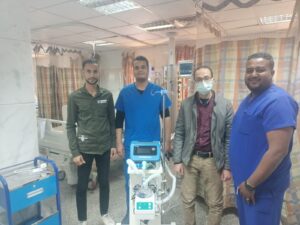BioBusiness for Medical Devices, one of the emerging technology companies specialized in designing and manufacturing advanced electronic medical devices, announced the manufacture of the first 100% Egyptian ventilator with the latest technology known globally in this field, the BioVENT A Series device.
BioBusiness for Medical Devices explained that the BioVENT A Series device was manufactured in the factories of the Arab Organization for Industrialization as the manufacturing partner for this project, and under the supervision of the Academy of Scientific Research and Technology, which is the main supporter of the project and supports research and development activities, in cooperation with the Ministry of Higher Education and Scientific Research – the Supreme Council of University Hospitals As the lead partner in clinical trials.
BioBusiness for Medical Devices revealed that 500 new devices are being produced at an investment cost of 50 million EGP, and that the company aims to double this number by the end of this year 2022, explaining that 50 devices have already been supplied to 13 hospitals,

Eng. Mostafa El-Wakeel, CEO of BioBusiness for Medical Devices, said that Egypt is now the first country in the Middle East and Africa to produce ventilator with 100% Egyptian technology that compete with European and American devices. The many groups and companies have tried in many countries to production of this type of device, but they did not complete the road and did not reach a final product, thanks to God and then with the great efforts made by everyone who contributed to this project, this project was implemented and reached a final product that exists today in hospitals and serves patients.
Mostafa, confirmed that the ventilator technology in the BioVENT A Series device is entirely Egyptian 100% in terms of the design of the device, software, most internal components and cables, with a local component of 70%, and the device is less than the foreign counterpart in the price by more than 30%.
Mustafa El-Wakeel pointed out that the manufacture of medical devices is a very complex process that requires approvals from many different parties, as well as a long time and a large group of engineers with different specializations.
Mostafa, continued, explaining the production stages of the first Egyptian BioVENT A Series ventilator, saying: “During the first pandemic in March 2020, all responsible authorities from the Ministry of Health and Medical Services in the Armed Forces, the Unified Procurement Authority and many experts were contacted, and based on these meetings, Agreeing to design a ventilator that is easy to transport and suitable for work in all environments, whether it is field hospitals, regular rooms, intensive care, or the home.
Mostafa, indicated that it was agreed that the device would support all types of treatment, whether oxygen, non-invasive or invasive with the same internal components of the device, provided that production and approvals take place in a phased manner, starting with high-flow oxygen devices and then non-invasive and then invasive ventilator to facilitate matters for the legislatures in particular to lack of previous experience in this field and based on the previous recommendation, BioBusiness Company designed the first Egyptian ventilator called BioVENT A Series so that it supports all previous recommendations with attention to quality and elegance in the design.
Regarding the economic feasibility of the project, the CEO of BioBusiness for Medical Devices confirmed that ventilators are important all the time and are not linked to COVID – 19 only, but we always hear about the problem of a shortage in the number of intensive care beds in hospitals due to the lack of ventilators, and it is expected that The global ventilator market reaches more than 18 billion US dollars in 2030, according to global statistics.
Mostafa, explained that his company aims to export to neighboring countries, especially in Africa and Central Asia, which is a source of hard currency for the country in light of the current crisis.






Discussion about this post